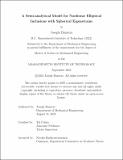| dc.contributor.advisor | Cohen, Tal | |
| dc.contributor.author | Bonavia, Joseph | |
| dc.date.accessioned | 2023-11-02T20:24:05Z | |
| dc.date.available | 2023-11-02T20:24:05Z | |
| dc.date.issued | 2023-09 | |
| dc.date.submitted | 2023-09-28T15:49:52.866Z | |
| dc.identifier.uri | https://hdl.handle.net/1721.1/152876 | |
| dc.description.abstract | Motivated to understand the stresses induced by the formation of precipitates in metals,
in 1957, John D. Eshelby provided a fully-analytical solution for the stress and
deformation fields induced by an incompatible ellipsoidal inclusion embedded within
an infinite matrix. Over the past six decades, his theory, which considers linearly elastic
materials, has been essential in developing homogenized micromechanical models
for metals and composites. However, as solid mechanics research increasingly focuses
on soft materials such as biological tissues, a linear theory is no longer sufficient.
Despite numerous potential applications ranging from medical diagnosis to industrial
manufacturing processes, an accurate analytical or semi-analytical nonlinear extension
of Eshelby’s theory of the elliptical inclusion problem has yet to be developed.
This work presents a novel approach to solve the 2D elliptical inclusion problem,
which satisfies incompressibility. It is shown to converge to the Eshelby solution in
the linear limit for the case of isotropically growing inclusions. Moreover, this model
matches almost identically to 2D finite element simulations for large incompatibilities,
far beyond the linear range, while providing a complete description of the field
through a single function. Finally, it is suggested that the simplified solution can enable
the use of homogenization methods for future nonlinear micromechnical models
and can help to elucidate various growth phenomena observed in nature. | |
| dc.publisher | Massachusetts Institute of Technology | |
| dc.rights | In Copyright - Educational Use Permitted | |
| dc.rights | Copyright retained by author(s) | |
| dc.rights.uri | https://rightsstatements.org/page/InC-EDU/1.0/ | |
| dc.title | A Semi-analytical Model for Nonlinear Elliptical Inclusions with Spherical Eigenstrains | |
| dc.type | Thesis | |
| dc.description.degree | S.M. | |
| dc.contributor.department | Massachusetts Institute of Technology. Department of Mechanical Engineering | |
| dc.identifier.orcid | https://orcid.org/ 0000-0003-4522-2582 | |
| mit.thesis.degree | Master | |
| thesis.degree.name | Master of Science in Mechanical Engineering | |
